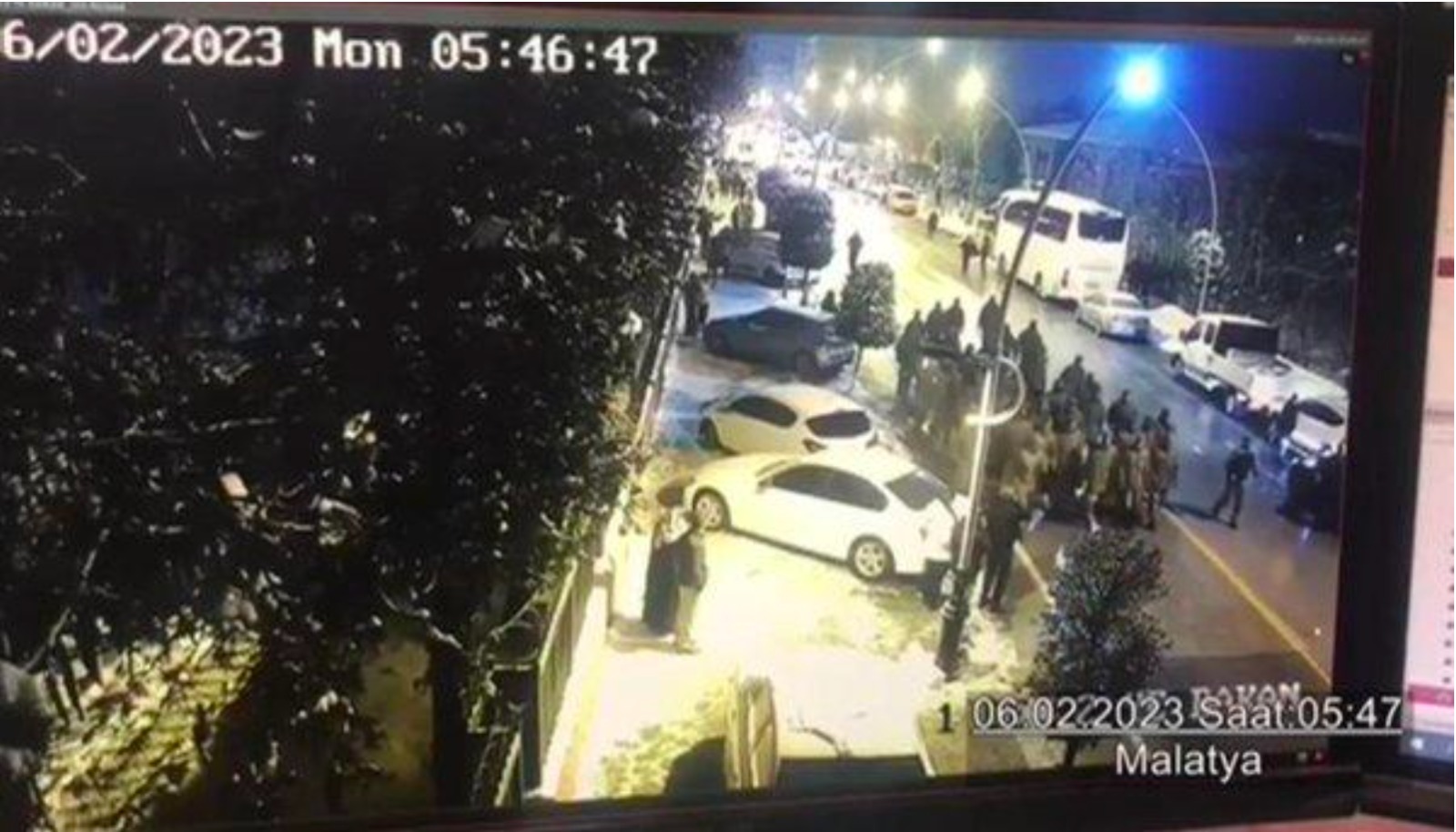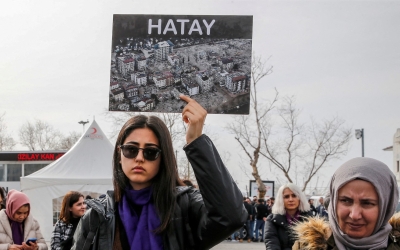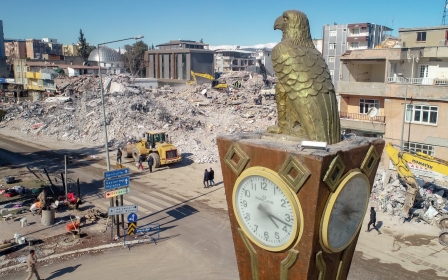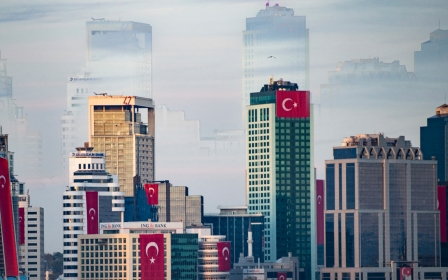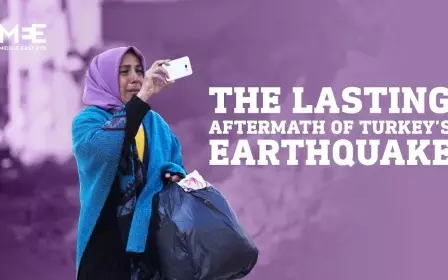Turkey: Inside the military's slow earthquake response
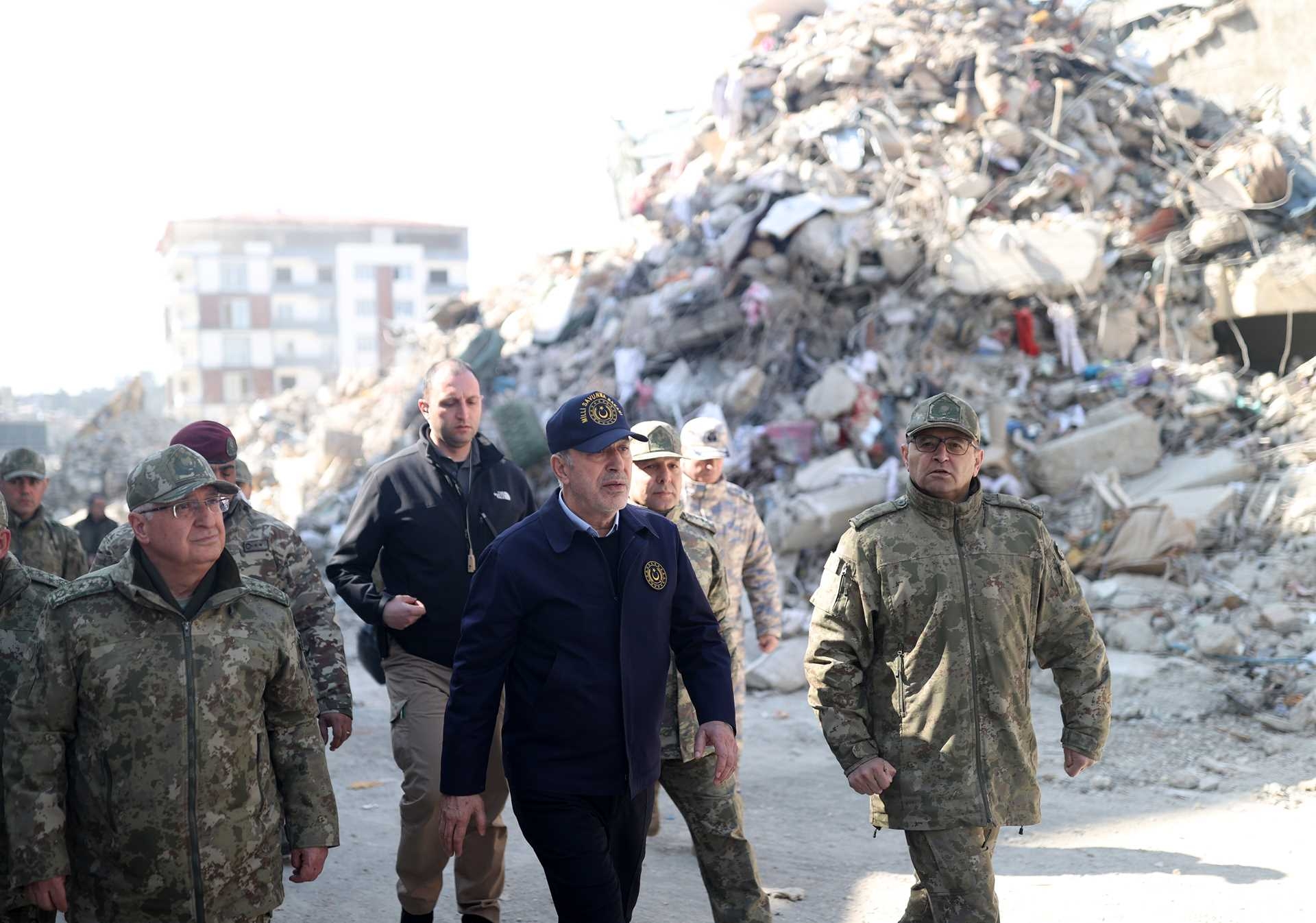
The twin earthquakes that killed more than 45,000 people in Turkey last month also triggered a debate whether the government was too slow to mobilise and deploy the military, Nato's second-largest ground force, in the search-and-rescue operations.
The government has already acknowledged the existence of some shortcomings, especially in the first 48 hours of the disaster, but Defence Minister Hulusi Akar has rejected claims that the army battalions were late to intervene.
Some opposition figures have even speculated that the government limited the use of the military in fear of an eventual coup against the government, while the chairman of the Turkish Red Crescent blamed the country's poor history of civilian and military relationship for the lack of proper engagement.
'We couldn't work in the rubble for a long time because we didn't have search-and-rescue training'
- Turkish soldier
Experts point out that the military wasn't included in Turkey's disaster response plan as one of the main response teams.
A senior Turkish official told Middle East Eye that, even though the military wasn't part of the response plan, the country's disaster management agency still used military infrastructure, namely vehicles and equipment such as helicopters and other resources.
New MEE newsletter: Jerusalem Dispatch
Sign up to get the latest insights and analysis on Israel-Palestine, alongside Turkey Unpacked and other MEE newsletters
"The military actively used its air force to deliver aid and dispatched ships to provide medical assistance," the official said.
The military did deploy its search-and-rescue group, the Humanitarian Aid Brigade, to the disaster zone in the first few days following the quake, but the contingent doesn't have more than 400 members.
'We did our best'
A Middle East Eye investigation has found that the military response varied in different areas in the earthquake zone, and there were technical problems beyond the allegations of conflict between the interior and defence ministers that slowed down the response.
The military did encounter difficulties reaching the earthquake victims, but these weren't due to lack of orders, but because of a lack of coordination and the absence of enough manpower and tools.
The area that covers the earthquake-hit provinces of Kahramanmaras, Malatya, Hatay, Sanliurfa and Gaziantep are the responsibility of the Second Army Command, which is also tasked with conducting counter-terror operations in northern Syria and northern Iraq. In this respect, the Second Army is the most intense and active unit of the Turkish military, which carries major responsibilities.
The military sources on the ground who spoke to MEE said the Second Army's buildings were also severely affected by the earthquake in several provinces.
Speaking to MEE from various provinces about the earthquake, military sources said that, on the morning of the earthquakes, the first of which had an epicentre about 40km northwest of Gaziantep city, the soldiers first evaluated the damage to their own garrisons, then went to the help of civilians the same morning.
A soldier on duty in Malatya, about 230km northeast of Gaziantep, which was among the centres severely hit, said senior officers dispatched his unit to collapsed buildings in the immediate vicinity of their garrison. "We didn't have the tools for search and rescue," he said. "We took many citizens out of the rubble by digging with our bare hands. Some died, some survived."
The soldier said that they could not intervene in debris that required more sophisticated equipment. "Headquarters didn't have many machines at their disposal. We couldn't work in the rubble for a long time because we didn't have search-and-rescue training. We did our best," he said.
The soldier added that his unit shared its food with the civilian earthquake victims as professional search-and-rescue teams arrived on the second day of the quake.
Another soldier who experienced the earthquake in Malatya said his unit was ordered to take a helicopter to analyse the situation in nearby districts and in the province hours after the quake, but they couldn't fly for a long time due to poor weather conditions and lack of fuel, which was distributed for immediate needs.
A soldier who survived the earthquake in Hatay, west of the border with Syria, said comparisons of the military response this year with that after the 1999 Golcuk quakes weren't logical, since the military now has more counterterrorism responsibilities and less manpower after reforms that professionalised the army and shrank its numbers.
"If one or two provinces were partially affected, it would have been possible to urgently send aid from four or five neighbouring provinces," he said. "A transportation and logistics network was required for the aid that should come from two directions due to damaged roads and airports. All neighbouring provinces with a large capacity were affected by the earthquake."
Insufficient troops and equipment
A military source said that around 5am on 6 February, shortly after the first earthquake struck, army units began local reconnaissance activities. The source said the number of units that came out for search and rescue was low compared to the immense destruction, so they couldn't have been considered sufficient.
The Turkish military's units in northern Syria were also impacted by the earthquake. Military brass issued an emergency order to withdraw some of the troops in Syria on the morning of the disaster.
"We were more inland, and our army base wasn't affected by the tremor; we were tasked to move to Turkey immediately," a soldier who was on duty in Syria told MEE.
"We did not have much appropriate equipment, but we tried to get the citizens from under the rubble by dispersing the equipment to the areas under our responsibility."
A soldier on duty in Adana, about 200km west of Gaziantep and also hit by the quakes, said they immediately rushed to collapsed buildings since they had a trained search-and-rescue battalion, saving 15 people. But the work was slow due to the absence of heavy machinery for some buildings, and a snowstorm prevented aid from coming into the earthquake zone.
Meanwhile, sources stated that although they received disaster-related orders in many regions, there was uncertainty for a while due to disruptions in coordination.
A senior military source told MEE that the criticism against the Turkish military wasn't fair, since the Second Army was focusing on its operations in northern Syria and keeping the bulk of its troops there.
The source said the Second Army ordered its troops to bring a large part of its construction equipment from Syria, where it had previously been dispatched to build fortifications and defensive lines, to Turkey two hours after the first earthquake. But the source acknowledged that it took a while to transfer it due to blocked roads and poor coordination on the ground.
Syrian opposition sources, local people and eyewitnesses reached by MEE confirmed the statements that construction equipment in this region was transferred to Turkey.
Sources speaking to MEE said the first of the commando units in non-critical bases in Syria entered Turkey at 7am on 6 February, three hours after the first quake, and were directed to Hatay.
The sources said staff and equipment in the Turkish military search-and-rescue centres were not adequate due to the extent of the destruction. This was due to the active units of the Second Army responsible for the earthquake area being stationed across the border.
The army units that went to civilian areas for search and rescue and to provide aid and security, experienced disruption in coordination just as happened with other public institutions, the sources said.
This article is available in French on Middle East Eye French edition.
Middle East Eye delivers independent and unrivalled coverage and analysis of the Middle East, North Africa and beyond. To learn more about republishing this content and the associated fees, please fill out this form. More about MEE can be found here.


